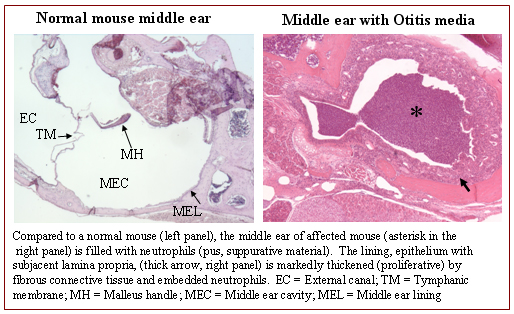Otitis Media
Middle ear infection or otitis media (OM) accounts for more than 30 million clinical visits annually with a cost of $5 billion per year in the U.S. The hearing loss associated with OM can cause developmental problems, including delayed language skills. The widespread use of oral antibiotics to treat OM has resulted in a dramatic increase in antibiotic-resistance of the bacterial strains that cause OM, as well as other potentially fatal diseases including pneumonia, meningitis and septicemia. The molecular mechanisms by which bacteria cause overactive host responses are still unclear. Vaccine development still remains a great challenge. There is an urgent need for developing novel therapeutic strategies against OM. However, genetic and genomic technologies hold tremendous promise for the development of new strategies that could dramatically impact this major health problem.
Mouse genetics has helped us to understand several inner ear auditory diseases in humans and mouse models represent powerful tools for advancing the understanding of OM. The objectives are to identify novel genes and/or novel functions of known genes that underlie OM susceptibility using a functional genomic- and phenotype-driven approach, and to develop innovative treatment strategies for human OM using mouse genetic models.

Personnel Involved
PI: Qing Yin Zheng, MD
Research Specialist: Cindy Benedict-Alderfer, Ph.D.
Research Assistant 4: Heping Yu, BS
Technician 1: Chunling Gu
Research Assistant 2: Robert Connelly, MS
Visiting Scientist: Shengli Li, MD
Research Associate: Fenchan Han, MD, Ph.D.


